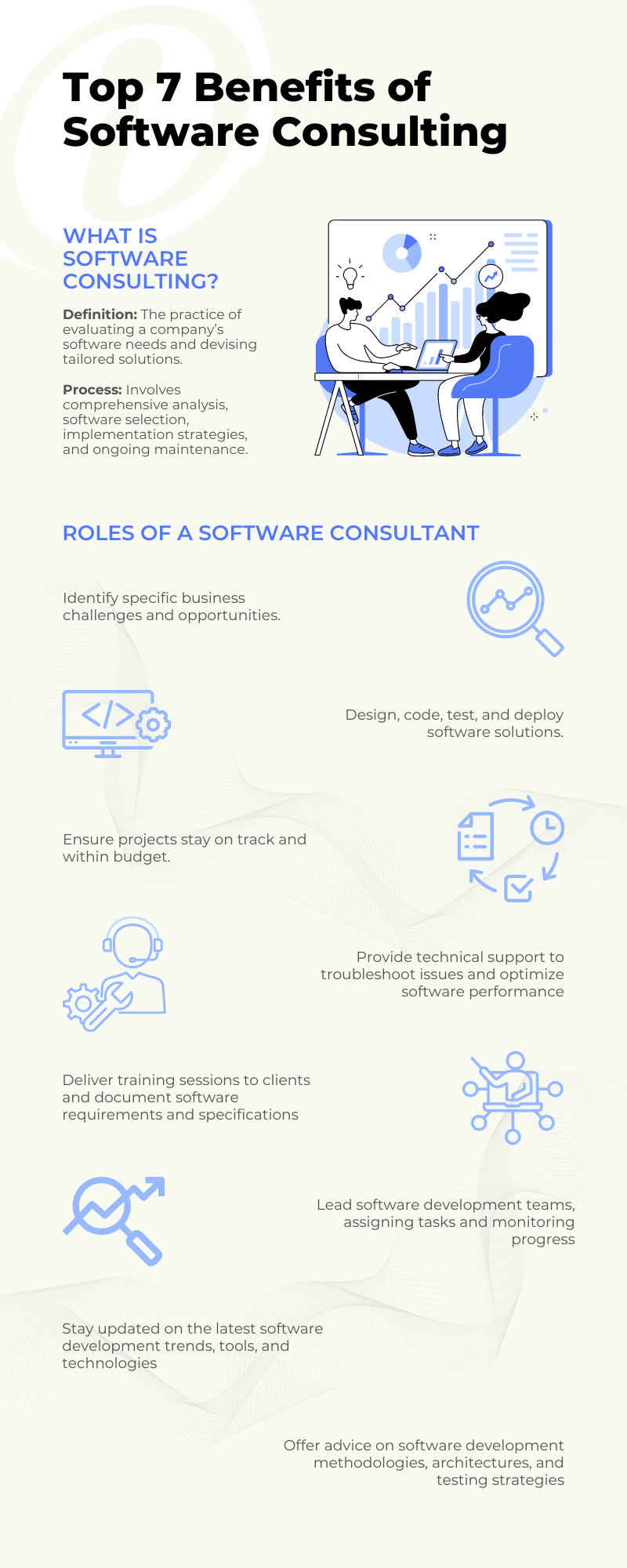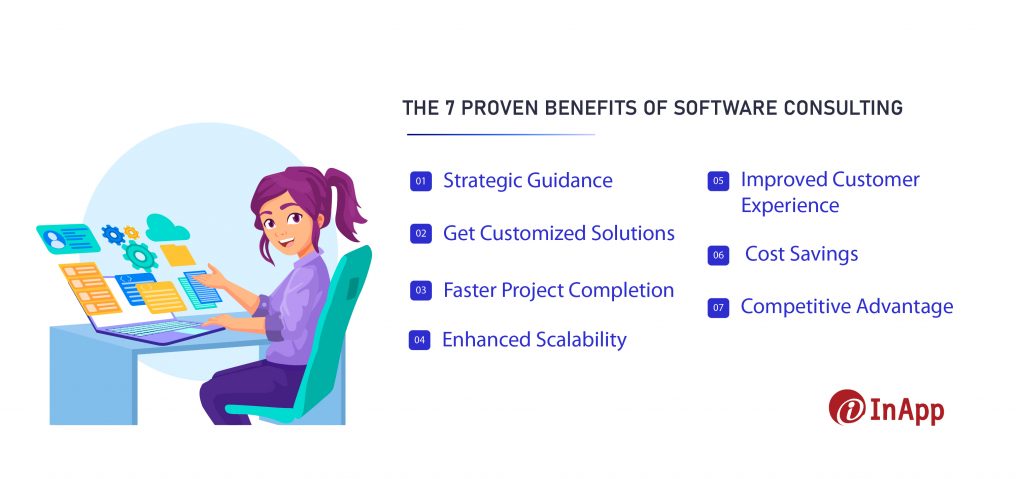Starting, taking over, or learning to manage a business is tough, right? Especially for small business owners who are practically running the show solo, managing operations, finance, marketing, and sales all at once.
This is where consultants come in as a ray of hope. These people with years of experience on their sleeves can easily pinpoint the pesky roadblocks holding your business back and give you personalized strategies to kick them to the curb.
And guess what? This is the same with software consulting too.
As business needs evolve, companies are increasingly embracing a digital-first strategy. However, the digital transformation journey isn’t easy; it requires careful planning and implementation. This is where a software consultant steps in to provide invaluable assistance. They guide companies through software modernization, help in setting and achieving key requirements, and offer expertise in adopting new technologies.
What is software consulting and What do software consultants do?
Software consulting is the practice of evaluating a company’s software requirements and devising tailored solutions to optimize its operations. It begins with a comprehensive analysis of the organization’s software ecosystem, delving into usage patterns and identifying areas for improvement. With this information, software consultants offer guidance on software selection, implementation strategies, and ongoing maintenance.
In short, software consulting is a partnership, a collaboration between consultants and clients aimed at achieving technological excellence. Consultants advise on software usage, recommend suitable products, facilitate system setup, and ensure ongoing security and efficiency through updates and monitoring.
Roles of a software consultant

Software consultants play a major role in guiding organizations through the entire software development and implementation journey. Their duties encompass a wide range of responsibilities, all aimed at delivering effective software solutions that align with the client’s business goals.
First and foremost, software consultants analyze clients’ business needs and requirements, collaborating closely to identify specific challenges and opportunities for improvement. They then leverage their technical expertise to develop tailored software solutions, meticulously designing, coding, testing, and deploying systems that meet client standards and expectations.
In addition to software development, consultants take on project management duties, ensuring projects stay on track and within budget, and deliver quality software on time. They also provide crucial technical support to address issues and optimize performance post-deployment.
Apart from these, software consultants play a pivotal role in knowledge transfer, delivering training sessions to clients and documenting software requirements and specifications to ensure clarity and completeness. They often lead development teams, fostering collaboration and mentoring to drive efficient workflows and high-quality deliverables.
In short, software consultants serve as trusted advisors, guiding organizations toward software solutions that drive growth and success.
The 7 proven benefits of software consulting
Software consulting offers a multitude of benefits for businesses seeking to leverage technology effectively to achieve their goals. From providing expert guidance to optimizing processes, software consulting can significantly enhance organizational performance and competitiveness.
Here are the top seven benefits of software consulting:

1. Strategic Guidance
One of the primary benefits of software consulting is the strategic guidance it provides. Consultants work closely with businesses to understand their objectives, challenges, and technological needs. They then offer tailored recommendations and strategies to align software solutions with the organization’s goals. By leveraging their expertise and industry knowledge, consultants help businesses make informed decisions that drive growth and success.
2. Get Customized Solutions
Software consulting can give you customized solutions designed to address your specific business needs and requirements. Consultants collaborate with clients to develop software systems that are tailored to their unique workflows, processes, and objectives. Whether it’s developing a custom software application or optimizing existing systems, consultants ensure that the solution meets the organization’s exact specifications, maximizing its effectiveness and value.
3. Faster Project Completion
A software consultant can accelerate project completion timelines by streamlining workflows, optimizing resource allocation, and implementing efficient project management methodologies. They assess project requirements thoroughly, identify potential bottlenecks, and propose innovative solutions to mitigate delays. By fostering collaboration, resolving issues promptly, and prioritizing tasks strategically, these consultants ensure faster and more streamlined project delivery, meeting deadlines with agility and precision.
4. Enhanced Scalability
Scalability is crucial for businesses looking to grow and adapt to changing market dynamics. Software consulting ensures that systems are designed with scalability in mind, allowing them to accommodate future growth and expansion seamlessly. Consultants design flexible and scalable architectures that can easily adapt to increasing workload demands, ensuring long-term viability and sustainability for the organization.
5. Improved Customer Experience
Software consulting plays a vital role in improving the customer experience by developing user-friendly and intuitive software solutions. Consultants prioritize usability and user experience (UX) design principles to create software interfaces that are easy to navigate and intuitive to use. By enhancing the user experience, businesses can increase customer satisfaction, loyalty, and retention, ultimately driving business growth and profitability.
6. Cost Savings
While investing in software consulting may seem like an upfront expense, it often leads to significant cost savings in the long run. Consultants help businesses identify inefficiencies, eliminate redundant processes, and optimize resource utilization, resulting in lower operational costs and increased profitability. Additionally, customized software solutions reduce the need for expensive third-party software licenses and minimize reliance on manual labor, further driving down costs and improving the bottom line.
7. Competitive Advantage
In today’s digital age, staying ahead requires leveraging technology effectively. Software consulting provides businesses with a competitive advantage by enabling them to adopt cutting-edge technologies and innovative solutions. Consultants help businesses harness the power of emerging technologies such as artificial intelligence, machine learning, and cloud computing, empowering them to innovate, adapt, and thrive in a rapidly evolving marketplace.
To Sum Up
In conclusion, the benefits of hiring a software consultant cannot be overstated. While it may initially appear as an additional expense, the expertise and efficiency they bring to the table often translate into substantial time and cost savings in the long run. From accelerating project timelines to optimizing resources and enhancing overall productivity, the value they offer is undeniable.
With over 20 years of experience in software development and consulting, our team stands ready to assist you. As one of the top software consulting companies, our services are designed to provide the support you require, leveraging the knowledge and skills of our senior tech engineers and consultants. Get in touch with us.
